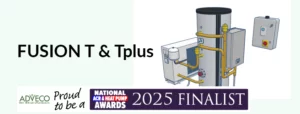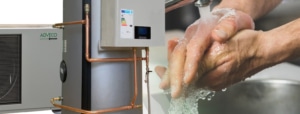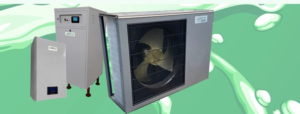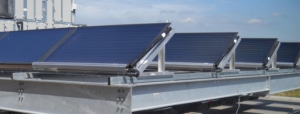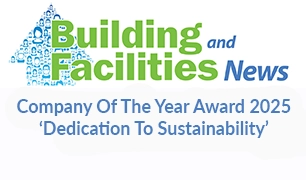Low Carbon & Renewable Water Heating for Hotels
Design, Supply and Service of Hot Water for Hotels
Hotels are continually fighting with their competition to offer the most affordable rates, the best amenities, and the most outstanding guest services — all while making a profit. Now more than ever green, or sustainable tourism is becoming a deciding factor when choosing a holiday. For the hotel industry this means achieving a sustainable business model that can offer considerable marketing advantage.
Hotels represent a unique 24/7/365 environment, but one where occupancy rates will fluctuate, but guests always will be demanding with high expectations for hot water instantly on demand and rooms that offer the warmth and comfort that match or preferably exceed the home.
In addition, hotels increasingly have diversified, from providing high end dining experiences to swimming pools, spa and gym facilities. These functions significantly widen demands for heating and hot water, which can be constant, significant but also varied.
It may appear difficult to predict and meet all these requirements, but not only is it possible, it can be achieved more economically and with less impact on the environment, which is a big tick in the box for guests becoming increasingly aware of, and seeking out greener alternatives for their stay.
Adveco brings over 50 years of expertise in designing, supplying, and supporting efficient hot water and heating systems. We combine traditional technologies with the latest low-carbon and renewable solutions to create bespoke systems for hotels, from boutique properties to national chains. Whether for new builds or refurbishments, we collaborate with consultants and architects to deliver optimally sized, efficient systems tailored to your hotel’s needs. This ensures lower upfront costs, reduced emissions, long-term operational savings, and maximized contribution to lowering carbon and NOₓ emissions.

Talk to us today about:
- Meeting domestic hot water (DHW) demands with commercial gas and electric water heaters, boilers, cylinders, packaged plate heat exchangers and electric immersion kits.
- Commercial heating support with ranges of floor-standing and wall-hung gas boilers, carbon steel heating buffers and thermal storage.
- Addressing sustainability through the integration of solar thermal, Air Source Heat Pumps (ASHP) and boxed heat recovery.
- Smart control systems for increased efficiency and managed transition via hybrid approaches that extend the life of viable systems while addressing the need to reduce carbon.
- Bringing all these varied elements together is Adveco’s packaged plant room offering, a bespoke prefabricated system build that makes full use of vacant space whilst leveraging all the advantages of offsite construction for hybrid and all-electric hot water and heating applications.

Live Metering – The most cost-effective and efficient path to sustainability for your hotel.
If you need assistance with a system for your hotel, then Adveco’s Live Metering service is for you. Live Metering requires an Adveco engineer to visit your site and install a water meter to provide hot water temperature monitoring for verified water data and comment on the risk of the existing system.
Adveco will return within the month to collect the meter. During these visits we can confirm space and clearances, and installation suitability, and once we have analysed the data give a truly accurate sizing and emissions/costs calculation.
- Quick, non-evasive temporary installation
- Visual site assessment & reporting by Adveco engineer
- Consistent 6 minute data 24 hours per day on existing hot water systems
- 50% of monitoring fee deducted if system recommendation purchased from Adveco
- Bespoke theoretical hot water modelling optimised to work with a building’s existing electrical supply
- Daily & annual hot water demands
- Annual estimated energy consumption
- Annual estimated carbon emissions
- Annual estimated operational costs
Adveco can then advise on a new hot water system which meets the demands of a building while increasing efficiency, lowering carbon emissions, and managing costs.
Heat Pumps For Lower Carbon Emissions In New Hotels
Commercial hot water (DHW) applications using air source heat pumps (ASHP) are going to be complex and, compared to gas-fired alternatives, are going to have higher up-front costs. Designing the system for peak efficiency, and therefore sustainability, is a must to help offset this
Related Products

AIR SOURCE HEAT PUMPs
Solar Thermal For Refurbishing Hotel Accommodations
A proven and extremely reliable technology, solar thermal offers a clear path to reducing CO₂ emissions.
Correctly designed and sized to the application, such as hotel accommodation, solar thermal systems can generate a considerable proportion of the hot water requirements for buildings that are already on-gas with relatively short payback periods on the initial capital expenditure, while leveraging lower-cost gas to meet peak demands.
Related Products
Electric Water Heating for Hotels
Electric boilers and water heaters help to meet the demands being made of the hotel sector to cut carbon emissions in line with net zero strategies. Increasingly less reliant on fossil fuels for generation, using the electricity grid is increasingly being specified as a cleaner energy source for water heating. Whether new build or the transformational refurbishment of existing hotel buildings, electrically powered systems provide an efficient, future-proof means for delivering fast, efficient heating for domestic hot water production or central heating needs.
Adveco appliances support a range of projects with wall-mounted and floor-standing systems to cater to the wide needs of hotel buildings. Packaged hybrid electric systems also offer a more compact, resilient, fast-to-install and easier-to-maintain alternative for those wishing to avoid a reliance on gas energy supplies.
Related Products
Gas Water Heating for Hotels
Hotel buildings with large hot water demands and an existing gas connection may continue to take advantage of this lower-cost energy resource to heat water. Whilst strongly urged to adopt a more environmentally friendly approach to heating a building’s water, many leisure organisations will still find value in remaining on gas. With minimal disturbance for business continuity if replacement is required, manageable capital investment and low operational costs this familiar technology remains a popular replacement option when older appliances fail.
For buildings already on the gas network and seeking to gain lower carbon status, replacement gas-fired appliances working in conjunction with heat pumps or solar thermal provide a familiar, practical, highly effective means for offsetting gas demands to lower carbon emissions of legacy gas-only water heating systems.
Adveco supports hotel projects with the latest generation of condensing gas water heaters. Harnessing cutting-edge materials, production and energy management technology, it is now easier than ever to maximise fuel use, cutting energy demands, running costs and carbon emissions. All new gas water heaters are also able to support future gas sources with up to 20% blended hydrogen without any alteration. This makes gas water heaters an excellent bridging technology for existing buildings, future-proofing systems in preparation for potentially larger investment decisions in the future as the nationwide net zero strategy is finalised.
Related Products
Hotels News
Hotel News
Getting Started With Sustainable Hot Water Systems
IAQ in Commercial Buildings
Public Sector Decarbonisation Latest Funding Phase
Sink or Basin-led Projects Go Low Carbon
Low-Carbon Hot Water: A Blended Approach
All Electric ? Sustainability & Water Heating Pt.3
Using The Sun – Sustainability & Water Heating part 2
Sustainability & Water Heating
Noise Pollution – What You Need To Hear














